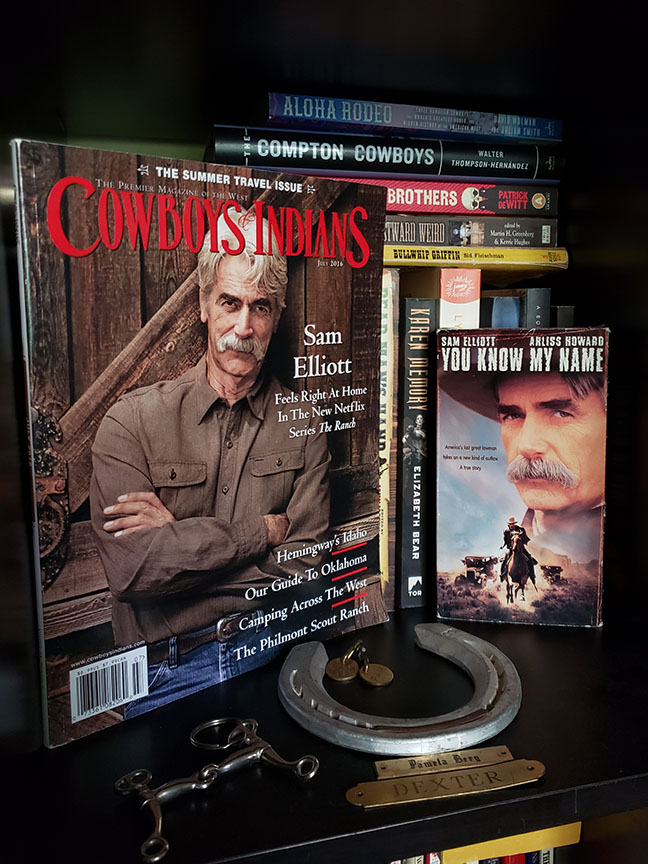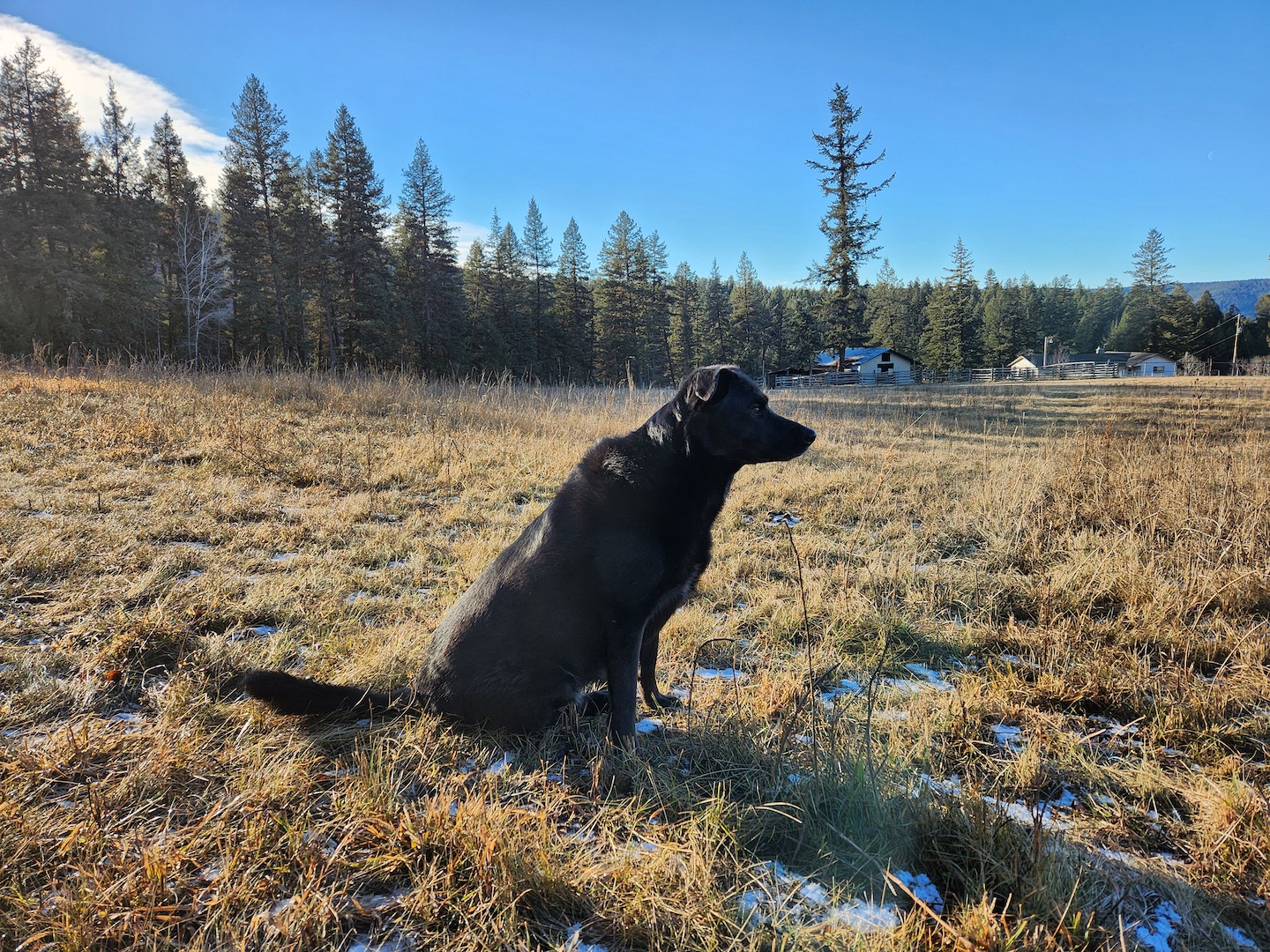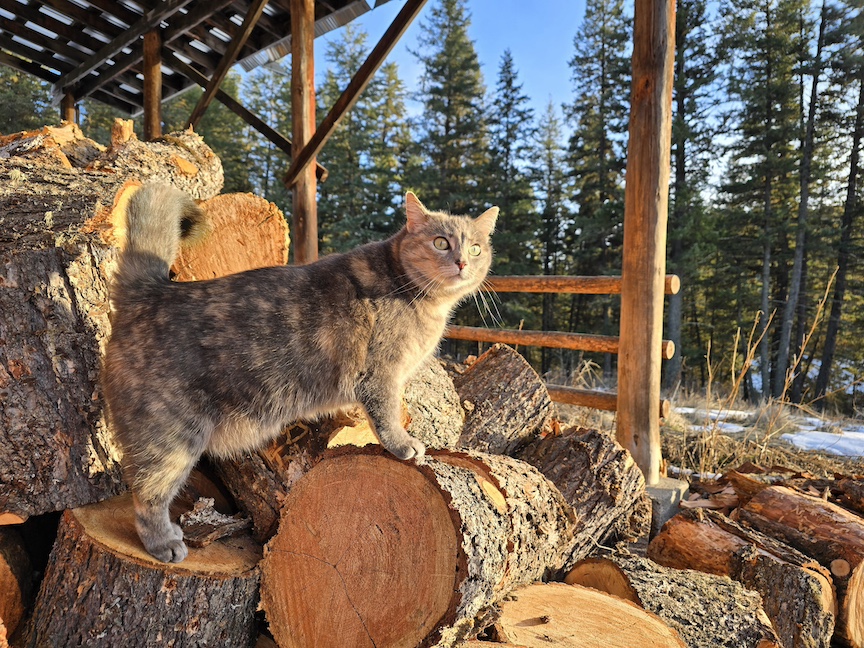Starring: Sam Elliott, Arliss Howard, Carolyn McCormick, James Gammon
Director: John Kent Harrison
Released: 1999
Mood: If you can’t decide between a tear-jerker drama or a glorified Western and need the powers of Sam Elliott and a good script to deliver on both.
“Actors don’t know anything about being outlaws.”
Bill Tilghman (Sam Elliot)
I can’t believe I had a VHS copy of You Know My Name sitting on my bookshelf for YEARS and never bothered to find a watchable version until now.
Like, I moved four times and set that VHS back up on display after each move because of course I want to look at Sam Elliott’s face while I browse my books. I don’t know why I didn’t seek the movie out, other than that I maybe assumed it would be terrible because I was super disappointed by his 1987 TV movie The Quick and the Dead.
The only reason I finally got around to seeing it is because my mom found a library copy and loaned it to me. And holy shit, am I glad she did. This is PRIME SAM ELLIOTT!
You Know My Name was released semi-hot-off-the-heels of 1994’s Tombstone, but here Elliott isn’t splitting the screen seven ways with that ridiculously talented cast. He’s got the reins for the entire movie, and the result is one of my favourite performances of his that I’ve ever seen. It fully supports my stance that the ‘90s were the best decade for modern Westerns.
I don’t care that it’s a TNT made-for-TV movie, or that it’s a heavily fictionalized account of Bill Tilghman’s last hurrah, or even that it was filmed in Alberta which looks absolutely nothing like Oklahoma.
- Fun Fact #1: Elliott apparently quit the project over the Canadian locale, and was convinced to come back but regrets not sticking to his guns.
You want gangster-meets-cowboy action, strong acting, and Elliott playing someone older than his actual age for once – You Know My Name is worth your time.

You Know My Name purports to be based on the true story of Bill Tilghman: friend of Bat Masterson and Wyatt Earp, a reputable lawman who helped bring in the Wild Bunch aka Doolin-Dalton Gang, a politician, and a self-made movie star.
It’s 1924 and Tilghman (Sam Elliott) is retired from his law career, but you can tell he’ll never truly give it up. He’s traveling to promote the movie he made that supposedly tells the straight facts about his adventures bringing in notorious criminals.
- Fun Fact #2: Tilghman and friends did make a 96-minute “documentary” called The Passing of the Oklahoma Outlaws, for which Tilghman co-directed, co-starred, co-produced, co-wrote, and promoted; only 13 minutes of the original footage have survived, and the film has been discredited by historians as largely fictitious.
A man from Cromwell, OK, begs Tilghman to come clean up his town. It’s the Prohibition Era, but they’re overrun by drinking, drugs, gambling, brothels, and murder. All of this debauchery is spurred by depraved federal agent Wiley Lynn (Arliss Howard). This guy is so into his own product that he thinks he IS the law.
Tilghman’s wife (Carolyn McCormick) begs him not to go, but at 70 years old, Tilghman can’t resist the chance to be somebody again.
Tilghman is a seasoned professional, but Wiley and his men play dirty. Tension builds to a dramatic crescendo, and you don’t want it to end because you know what’s going to happen and you don’t want to see it but also you do because this is GREAT f*cking TV.
The last note I managed to take down before I descended into ugly crying was “OMG THE FEELS I CAN’T” and that’s the truth.
![]()
Sam Elliott, the man, The Moustache™, is giving you all of those eyebrow raised, one eye squinted, knowing looks that have always made him the perfect noble Western lawman. But here you get something new. Elliott also has tender moments, sweet smiles, and terribly human conversations.
He’s a good guy, a loving husband and father. His wife keeps saying that there are no more heroes in the West, but you see in the way Elliott speaks and carries himself, in every penetrating stare, that he believes there should always be heroes on horseback – and he wants to be that hero one more time.
At one point, Wiley declares that Tilghman doesn’t care about the people, only about bolstering his reputation, and he’s not wrong; Elliott reveals a fierce pride and ego in fleeting moments where the seemingly infallible Tilghman is caught off guard.
Arliss Howard as Wiley is an unexpected masterclass in villainy. From his first scene, it’s like watching the madness of The Joker. This guy is sweating, laughing, threatening people, doing murder, and basically being a maniac.
Howard handily delivers someone with a sweet face who can be charismatic yet batshit crazy. His twitching and fumbling is just subdued enough to feel wholly realistic.
The other standout for me is James Gammon, who has been in almost every Western I’ve loved. Gammon appears at the start as outlaw Real Arkansas Tom, a man Tilghman sprung to star in his movie because the actors couldn’t get it right.
Gammon had this unique ability to be the ‘it’ factor that cemented a movie as a Western, despite his tiny roles. It’s like okay, you have some guys in hats on horses, but there’s James Gammon and now we’re officially in the Old West.
![]()
Where Roy Rogers Westerns throw me off with their juxtaposition of early automobiles and cowboys, You Know My Name swirls it all together in this filthy, grimy muck of a town that hosts oil rigs and saloons, wiseguys and ranchers, and so much brawling and shooting and mockery of the law that it’s like a ‘20s version of Deadwood meets Dick Tracy.
Using semiautomatic guns out a car window against Sam Elliott on horseback feels so utterly wrong, yet it works. And he fits perfectly into the silent black-and-white film shorts of Tilghman’s movie.
You Know My Name is much better than your average TV movie, because there isn’t a weak performance in the bunch. The action is well-shot, and the story is gripping from start to finish.
Now, is any of this movie’s evocative script actually true? It’s a tough call.
- Tilghman’s second wife published a heavily romanticized biography of him in 1949, which contains lots of facts that have since been disproved or simply can’t be proved
- Wikipedia’s version of Wiley shooting Tilghman supports the movie’s plot
- Other takes reveal that Tilghman had been known to threaten Wiley’s life, and that it was Wiley’s mangled hand (confirmed in the Wikipedia article) that caused him to accidentally shoot the gun before Tilghman grabbed him
- Bill Tilghman’s own Wikipedia article states that Tilghman was repeatedly arrested in his early law career for attempted train robbery and horse theft, including an arrest by his own partner, Bat Masterson
- Tilghman’s deputy, Hugh Sawyer, either testified that he couldn’t see what happened, or he didn’t appear in court to testify at all, depending on which account you read
That’s the trouble with the Old West – a lot of the records we have were written by people with a huge bias. Witnesses could be bought. Books and articles were easily published.
We can’t know how it all went down, so we have to sit back and be entertained by what screenwriters craft for movies like You Know My Name, and just not take these versions as historic fact.


